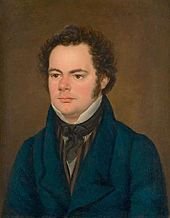As many of you may or may not know, today is Schubert's 220th birthday.I was telling my theory teacher about Mozart's birthday yesterday and he goes "Oh, well did you know tomorrow is Schubert's birthday?" and I said "No, can you recommend some pieces for me?" so I've decided to devise a list of 10 of his compositions that my music theory teacher helped me to pick out. Here's a little bit about Schubert
The Life of Franz Schubert
| Schubert was born on January 31st, 1797 in Himmelpfortgrund, Austria. He received a vast amount of knowledge about music (instruction in violin from his father, and piano from his brother) at a young age as the son of a school master. |

|
Because of this, he was awarded admission to his father's school at the age of 7. After a year at his father's school, he began to receive instruction from the organist and choirmaster of a local church, Michael Holzer. In 1804, Schubert came to the attention of Antonio Salieri, Vienna's musical authority at the time. Salieri became interested when he heard Schubert sing.
In 1808, he began to study at the Stadtkonvikt, for which he received a choir scholarship. This was where he heard, for the first time, the symphonies and overtures of esteemed composers such as: Haydn and Mozart (back then to hear these works, you had to see a live performance). This is what broadened his musical education. At the time, Schubert became incredibly influenced by the compositions of German composer, Johann Rudolf Zumsteeg. Schubert had an interest in"modernizing" his pieces. It was at this time, Schubert began to demonstrate his ability to compose. As a result of this, Salieri accepted him as a student in the field of music theory and composition.
Towards the end of 1813, Schubert left Stadtkonvikt to return home and begin training to become a teacher at the Normalhauptschule.
| In 1814, he was instated as a teacher of the youngest students at his father's institute. He remained at this post for about two years before, while continuing to study with Salieri until about 1817. |

|
Eventually, Schubert took up a position teaching in Rassau, as his father had recently taken a job there. He began to receive attention from the press after a performance in February of 1818. It was at this time that his composition style, became cemented. As a result of this, he began to receive more attention from the public for his different works.
| In 1828, Schubert became sick, and feared he was near death. It has been said that he died from syphilis, due to the fact that he had symptoms of mercury poisoning which was used back then to treat syphilis. At the time of his death, he was buried next to Beethoven, by request. |

|
Many of Schubert's works were unpublished at the time of his death. Only around 100 of his pieces had been published out of about 1,500. These pieces remained unheard until in 1838, Robert Schumann found the dusty manuscript of Schubert's symphony known as "The Great symphony" and brought it to Leipzig to be performed by Felix Mendelssohn, and in 1867 when Sir George Grove, and Arthur Sullivan published a vast amount of material that had been written by Schubert. These two events made Schubert's work become more widely known.
10 Pieces
10. Der Doppelgänger
This piece is rather eerie, translating to "The Spirit Double" it talks about seeing the house where someone you loved used to live. It talks of the past, or spirit, as haunting. I began to listen to this song yesterday, and it has given me goose bumps every time I listened to it. It demonstrates the vast amount of knowledge Schubert had of chords. My theory teacher constantly tells me that Schubert was ahead of his time in knowledge of chords.
9. Der Leiermann
This piece is about a man who is poor and lonely, going through rough times in his life. I think this piece depicts how Schubert felt people looked at him, considering that he was never a "major hit" and died penniless. Schubert was definitely an expressive composer, and a lonely man based on the last two pieces.
8. Rondo in B Minor for Violin and Piano
To me, this piece depicts floating on the sea, sometimes the tides and waters can be rough, and others it is gentile. This piece might also depict a relationship, considering that a relationship also sometimes has its rough parts, fun parts, boring parts, and exciting parts.
7. Der Erlkönig
This piece is another song by Schubert, it is about a father who catches his son in a fit of fear. The son says that the "Alder-king" and the father basically says, nonsense it's just the wind. The son keeps complaining to the father and he keeps dismissing the claims, until his son is hurt by the Alder-king and winds up dying while the father tries to get him to safety. I like this piece, I enjoyed reading along while the singer sang it in German, here is the link to the English translation.
6. Death and the Maiden String Quartet
When listening to this piece I can almost imagine a woman running from death. Experiencing death's hand all around her, grasping and barely missing. Maybe, she is in severe trouble, for committing a crime, or maybe she just feels as though circumstance is against her. What ever the case, I can see why the title is Death and the Maiden, try listening to the first minute whilst having your eyes closed imagining a young maiden on the run.
5. Piano Trio No. 2 in E-Flat
I feel this piece depicts the wind in a way. It flows like the wind on a cool fall morning, and gains and lessens in intensity. I like the piano part for this piece, I think this piece demonstrates that Schubert knew how to portray different emotions to an audience. Some of the other pieces on this list have, in a way been thrillers, I feel this one shows that Schubert could also write triumphant/euphoric pieces.
4. Rosamunde Overture
This piece makes me think of when I was younger, riding to a local deli with my friends on our bicycles to buy food, then riding around the neighborhood the rest of the day. I feel this piece, just depicts the relationships you have with your friends when you are younger, some days riding on bicycles, others arguing.
3. Sonata in B-Flat Major
This is an absolute beautiful piece on Schubert's part. It makes me imagine soaring through life as if nothing can effect me. I have had this piece downloaded since a few months ago, when I included it on another list. I can tell you, I have been listening to at least the beginning almost daily on the bus ride home.
2. Mass In E-flat Major II - Sanctus
Sanctus translates to ghost in google translate, so I can imagine this is the movement of a mass dedicated to the holy ghost. I like when around 2 minutes in Schubert has the men sing a moving bass part, separate from the women. I really enjoy moving parts in choral pieces.
1. Symphony no. 9 (The Great) Movement 1
I like the regal horn part in the beginning of this piece. It makes me think of a triumphant return from an experience that has completely changed who you are. This movement feels defiant, like it depicts taking back control of your life and the excitement you experience when you go through this.
Thanks for reading/listening to this! As I said on Mozart's birthday, this day is definitely an important day as it was the birth of a genius. I feel Schubert's story can inspire anyone to work hard even when it seems like all you'll ever do is fail. Schubert died in failure, yet he still succeeded, and I think all of us can learn something from his story. As always, please leave feedback, let me know which piece you enjoyed the most, and remember to check back later! (Definitely listen to these pieces the next time you get a chance).











